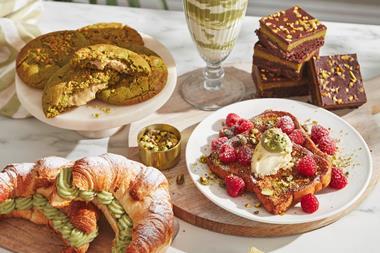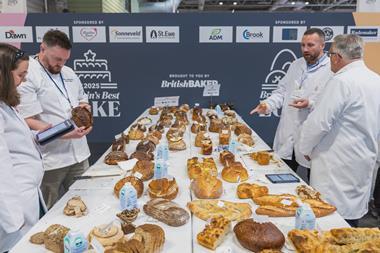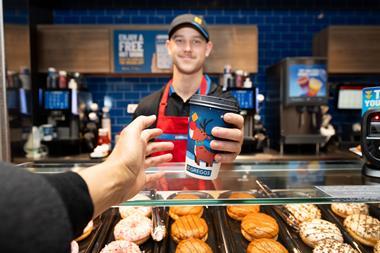Long-fermentation loaves, artisan products and those with health benefits are generating quicker sales than the category average... so how can retailers capitalise?
Forget fast food. The slow food movement is transforming British baking. Demand for long-fermented artisan loaves, sourdoughs and handmade goods is booming.
Supermarkets are also benefiting. Sales of speciality bread and artisan loaves have surged 10.3% to £135m [IRI 52 w/e 10 February 2018]. Punters will pay more for such products too. Kantar Worldpanel notes a 23.6% surge in take-home sales of premium-tier own-label bake-off goods sold through in-store bakeries, driving a 2.7% rise in average price [52 w/e 28 January 2018].
So what kind of products and wider trends are driving this growth? And what are suppliers and retailers doing to cash in?
“Speciality breads and artisanal loaves are seeing consistently high growth levels,” says Délifrance marketing director Stéphanie Brillouet. “This includes spelt breads and inclusion loaves, and loaves baked with traditional techniques. The buzz around sourdough shows no sign of slowing, partly due to consumer interest in gut health.”
Examples abound: Délifrance’s new Feel Good and Heritage ranges (see p34) include rustic sharing loaves and seed-topped boules; Aryzta has launched a new sourdough range; and supermarkets stock a growing line of artisan loaves.
“We’ve recently developed and expanded our artisan speciality bread ranges, adding new lines with long-ferment processes, and have looked at proving in baskets to give an authentic look and taste,” says Asda master baker Maddie Munden, pointing to the retailer’s new ancient grain and sourdough boules and Mediterranean and chilli bloomers.
Meanwhile, Bridor has high hopes for its Gourmet line-up, which features ancient grains such as buckwheat, rye, spelt, chia, amaranth and red quinoa as well as seeds such as millet, poppy, sesame and sunflower.
The inclusion of such ‘superfoods’ makes sense, appealing to affluent consumers for whom the ingredients these products contain is crucial. “Speciality and artisan loaves either give you more of something you need, or less of something you’re trying to avoid,” says Délifrance’s Brillouet.
“As the speciality bread market grows, we’re expecting greater interest in high-fibre and high-protein loaves. Over the coming year, more operators will be appealing to this growing trend, utilising different flours or inclusions. Spelt-based breads are higher in protein than your regular loaf, for example.”
Specific functional benefits such as higher protein or fibre levels are only part of the appeal of specialist loaves, however.
They’re also seen as the antithesis of sliced loaves of plant bread that, in spite of ongoing ‘pile high sell cheap’ tactics in the supermarkets, continue to fall out of fashion. This, in part, is thanks to the perception that processed foods are somehow less ‘healthy’ than handmade products.
“Texture and appearance are of primary importance for artisan loaves, with a greater focus on the finish of bake-off breads,” says Bridor commercial director Erwan Inizan. He adds that the firm’s Gourmet range was developed to have an “irregular, freshly baked appearance” and that the inclusion of germinated seeds in its Seed & Cereal loaf gives a softer texture.
“Long fermentation and a high hydration rate ensure the best texture, crumb and appearance once baked. Our latest bake-off breads have been developed with a 70% hydration rate, which results in an appealing honeycomb texture.”
Such properties provide a valuable counterpoint to plant bread, he notes. And even if shoppers understand that the artisan loaves and sweet treats sold in their local supermarkets aren’t as authentic as they seem (supplied pre-baked and finished in-store, for example) that isn’t necessarily a barrier to purchase.
That’s because the smell of freshly baked (or finished) products is just too good, according to research conducted by Dawn Foods with Oxford University’s Crossmodal Research Laboratory into the relationship between the senses and food purchase decisions.
“Consumers are increasingly savvy and understand that many bakery items are not made in-house,” says Dawn Foods marketing manager Jacqui Passmore. “Our research tells us it’s the aroma as well as the quality, innovation and taste of the product that will tempt consumers to purchase.”
While Kantar Worldpanel notes a 3.1% fall in take-home sales of bake-off goods, sales of bake-off products for immediate consumption are in solid growth. “In 2017, 95% of the UK engaged with the food-to-go market, spending an average of £508 each,” says Lantmännen Unibake UK assistant brand manager Samantha Winsor, quoting Kantar data [52 w/e 13 August 2017].
“Snacking is the biggest occasion contributing to the food-to-go market, with consumers on average purchasing a snack on the go 5.8 times a month, and 63.9% of out-of-home snacks involve bakery products.”
Of course, there are challenges to overcome if retailers are to cash in by going artisan. “Production of an artisan loaf versus traditional loaves can be a little longer, which means these products require more planning from an operational point of view,” says Aryzta Food Solutions marketing head Paul Whitely.
But the benefits can be significant. “In convenience, in-store bakery shoppers spend more and shop more frequently than average shoppers,” adds Whitely, pointing to 2017 analysis by HIM Research & Consulting. “On average, an in-store bakery generates an extra £51.04 per shopper per month.”
This might be slow food, but there’s nothing sluggish about sales like that.
Theatrical makeup
Bread isn’t just one of the most widely bought staple foods in Britain. Presented in the right way, it can also be a powerful sales tool that can help retailers lure customers through their doors and encourage them to spend more.
Developing a sense of theatre in in-store bakeries is crucial to achieving this.
“There is a real feeling that the retailers doing it best are removing the barriers between producing and selling a product and the point of consumption,” says David Martin, joint MD of retail design consultancy M Worldwide, which has worked with players ranging from Morrisons to petrol forecourt retailers in developing in-store bakeries.
“Traditionally, bread in the supermarkets is piled up and hidden behind packaging, which makes it feel commoditised. Now, retailers are realising that consumers either want to see it being made from scratch or presented in a way that’s close to them and feels more natural. The ones really nailing it with in-store bakeries are those that have narrowed the gap between the oven and the point of consumption.”
Artisan bakeries such as Gail’s and Princi present products unpackaged on rustic tables that would look more at home in a farmhouse kitchen than a high street retail chain. Stainless steel baking trays and ovens are on full display and finishes such as bare brickwork and cooling racks help complete the effect.
The big supermarkets are taking note, with commentators pointing to efforts by players such as Morrisons, Waitrose and Tesco.
“The artisan bakers that have really nailed it have their goods on a pedestal and treat them carefully,” adds Martin. “Morrisons, which used to always have its fresh fish counters front of store, has started to move their in-store bakeries to front of store to show off what they’re doing [see picture].”
“Fresh baked bread is retail gold when it comes to selling to the senses: it smells great, looks great, tastes great and feels great,” adds Rich Ford, director of new business at retail design consultancy Sherlock Studio. “Some supermarkets are using tasting tables to whet their consumers’ appetites, allowing consumers to feel, smell and taste the bread.”
Smell is crucial, according to Charles Spence, professor of experimental psychology at Oxford University, who has worked with Dawn Foods on research into the links between the senses and consumers’ purchase decisions.
“Bakery aromas signal freshness,” explains Prof Spence. “Colleagues in the flavour and fragrance industry tell me aromas like bread are among the hardest to create synthetically. As such, authentic bakery aromas may be so appealing, in part, because they cannot be ‘faked’.
New product development
KaterBake bite-sized treats Central Foods
- Launched: Spring 2018
These three mini doughnut balls (jam-filled, chocolate-filled and sugared) and two mini muffins (apple & cinnamon and chocolate hazelnut) are tapping rising demand for small sweet treats.
Sourdough Bloomer
- Aryzta Food Solutions
- Launched: Spring 2018
With an rsp of £2.95 per 420g loaf, this bloomer shows how much of a premium artisan credentials can command. As part of a new sourdough line, it’s positioned as a posher sandwich carrier.
Organic Country Style Loaf Bridor
- Launched: Spring 2018
Nothing says ‘artisan’ at first sight like an uneven shape. Bridor says the loaf’s irregular shape is the result of long fermentation and leavening (rsp: £1.50/400g).
Céréales Héritage Baguette Délifrance
- Launched: Spring 2018
Part-baked in stone ovens, this 290g sourdough baguette is made with malted rye grains, pumpkin seeds and brown and yellow linseed. It is aimed at the foodservice market.
































No comments yet